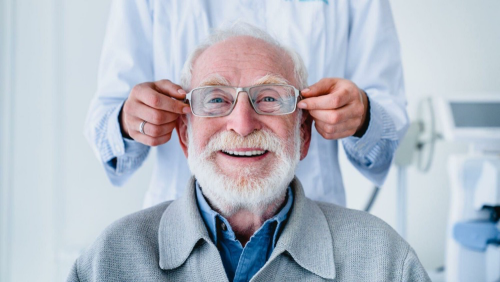A macular hole is a small tear in the macula, the central part of the retina responsible for clear, detailed vision. Though relatively rare, macular holes can significantly affect daily life, impairing abilities like reading, driving, and recognizing faces.
While older adults are more commonly affected, this condition can also occur in younger individuals due to trauma, certain eye conditions, or other factors. Understanding the causes, symptoms, and treatment options for macular holes is essential to preserving eye health and vision.

What is a Macular Hole?
The macula is a small, sensitive area at the center of the retina, crucial for high-resolution, central vision. When a macular hole develops, the macula experiences a tear or break, leading to blurred or distorted vision. The macula's function is key to tasks like reading fine print, recognizing faces, and driving, so the effects of a macular hole can significantly disrupt daily activities.
The condition often occurs due to changes in the vitreous gel inside the eye, which shrinks and pulls away from the retina as we age. This detachment can exert stress on the macula, eventually causing it to tear. Though age is a major risk factor, other causes and contributing factors can lead to the development of macular holes.
Causes and Risk Factors
The exact cause of a macular hole is not always clear, but several risk factors have been identified:
- Age: Macular holes are most commonly found in individuals over the age of 60. Age-related changes in the vitreous are the leading cause of macular hole formation.
- Eye Trauma: A blow to the eye or head can cause a macular hole, particularly if the injury impacts the retina or vitreous body.
- Myopia (Nearsightedness): Individuals with severe nearsightedness are at an increased risk due to the elongated shape of the eye, which increases strain on the retina.
- Other Eye Diseases: Conditions like diabetic retinopathy, retinal vein occlusion, or uveitis can contribute to macular hole formation.
- Family History: A genetic predisposition may also increase the risk, as having close relatives with macular holes can make an individual more susceptible.
Symptoms of a Macular Hole
The symptoms of a macular hole can vary depending on its size and location, but common signs include:
- Blurry or Distorted Vision: The most noticeable symptom is often blurred or distorted central vision. Straight lines may appear wavy, and central vision becomes less sharp.
- Difficulty with Fine Detail Tasks: Activities like reading, sewing, or recognizing faces may become more challenging.
- Dark or Blank Spot in the Center of Vision: A dark or empty spot may appear in the center of your visual field, making it hard to focus on objects.
- Visual Distortion (Metamorphopsia): Straight lines or objects may appear bent or out of shape, which is a hallmark of macular hole-induced vision changes.
If any of these symptoms are noticed, seeking medical attention early is important. Timely treatment can reduce the risk of further vision loss and improve recovery outcomes.
Diagnosis
To diagnose a macular hole, an eye care professional will perform a comprehensive eye examination. The following tools may be used:
- Dilated Eye Exam: Eye drops are used to dilate the pupil and allow a more thorough examination of the retina and macula.
- Optical Coherence Tomography (OCT): OCT uses light waves to create detailed cross-sectional images of the retina, enabling precise identification of the macular hole.
- Fluorescein Angiography: This imaging test involves injecting a dye into the bloodstream, which helps highlight blood vessels in the retina. It allows the doctor to assess the extent of damage or any abnormal changes caused by the macular hole.
Treatment Options
Treatment for a macular hole typically involves surgery, especially if the hole is causing significant vision problems. The goal of surgery is to close the hole and restore as much central vision as possible. Common treatment options include:
- Vitrectomy: The most common treatment for a macular hole, vitrectomy is a surgical procedure where the surgeon removes the vitreous gel from the eye to relieve pressure on the retina and macula. A gas bubble is often injected into the eye to hold the edges of the macular hole together and promote healing.
- OCT-guided Surgery: In some cases, the surgeon may use Optical Coherence Tomography (OCT) during the procedure for enhanced precision, helping to guide them as they repair the macular hole.
- Post-Surgery Care: After surgery, patients may need to maintain a specific head position for several days, helping the gas bubble stay in place and facilitating the healing process. Follow-up visits are crucial to ensure that the hole is healing properly and that no complications arise.
Living with a Macular Hole
While a macular hole can significantly impact your daily activities, surgery can often help restore vision, though the results can vary. Post-surgery recovery may involve adjusting to changes in vision and using low-vision aids. These aids, such as magnifiers or large-print books, can help with tasks like reading.
Additionally, patients should continue regular eye exams and follow the prescribed post-operative care plan to achieve the best possible outcome.
Conclusion
Macular holes are a serious eye condition that can significantly affect central vision. However, with early detection and appropriate treatment, such as vitrectomy surgery, many patients can regain or stabilize their vision. Regular eye exams and awareness of the symptoms are crucial, especially for those at risk, such as older adults or individuals with conditions like myopia.
If you experience any changes in your vision, it is important to seek professional evaluation and treatment. Early intervention can improve your chances of maintaining good vision and quality of life.





